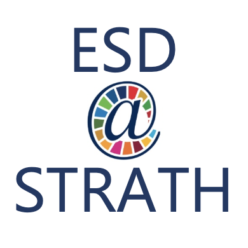In our Vision 2025 strategy, Strathclyde committed to “placing Education for Sustainable Development at the heart of its curriculum”. What do we mean by Education for Sustainable Development?
Sustainable Development can be defined as ‘development that meets the needs of the present without compromising the ability of future generations to meet their own needs’. Fundamentally, it is about trying to achieve a balance between the economy, society and development.
Education for Sustainable Development (ESD) seeks to empower learners to transform themselves and the society they live in by developing the knowledge, skills, attitudes, competencies and values required for addressing global citizenship and local contextual challenges of the present and the future.

What are the Sustainable Development Goals?
In 2015, the United Nations launched their 2030 Agenda for Sustainable Development. The 17 Sustainable Development Goals (SDGs), or Global Goals, represent their aims, which include eradicating poverty and hunger, ensuring access to healthcare, quality education, affordable energy and clean water and sanitation to all, reducing inequalities, achieving gender equality, and tackling climate change. You can read more about the SDGs on the UN website.
